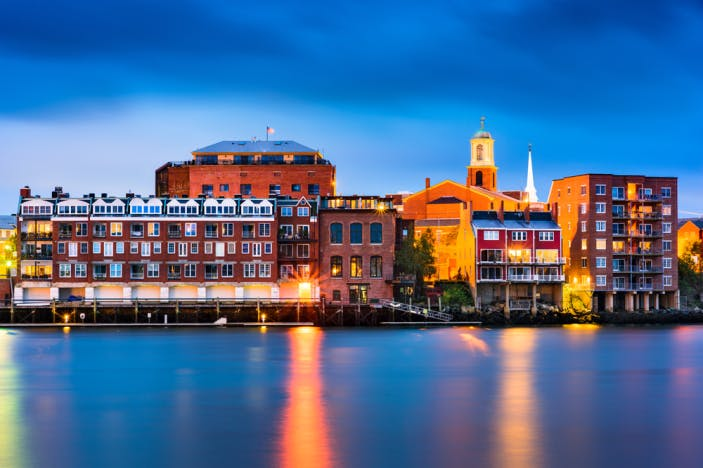
The words “freedom” and “New Hampshire” are almost synonymous — especially if you live in the Granite State. Along with its neighbors Connecticut, Vermont, and Maine, the Northeast, in general, hosts the most freedom-loving states in the U.S.
Nevertheless, not even New Hampshire is completely free and clear of crime. Although the state enjoys far less crime than most other states, with both a violent crime rate (1.99 per 1,000 residents) and property crime rate (17.46 per 1,000 residents) well below the national median, crimes do still happen. In fact, if you’re in Manchester, Keene, Laconia, Haverhill, or Lebanon, not only are the crime rates in your area higher than in other parts of New Hampshire, they are also higher than the national median.
It’s generally a good idea for residents, especially those in areas with higher-than-average crime rates, to investigate the value of purchasing a home security system from a reputable home security provider. But how do you approach that task?
Home Security Provider Requirements for New Hampshire
A good home security provider in New Hampshire can be measured both on how well that company maintains standards, and state regulations.
Unfortunately, that freedom we mentioned earlier comes into full effect regarding regulations on many industries in New Hampshire including alarm companies. While armed security guards are well regulated in the state, there are no regulations worth noting on home security providers. For example, while most states require security system installers to possess a low-voltage certification or license, New Hampshire does not.
This means that the alarm companies in the state are not just unregulated, but are only held to common business practice laws. New Hampshire residents will have to do some due diligence in researching alarm companies and hope that the ones they research are both reputable and trustworthy. Here are a few tips to do that:
- Check business rating agencies, such as the Better Business Bureau (BBB)
- Check online forums where people discuss their interactions with the company
- Check [!link!/]
The benefit of choosing a national alarm company is that they will be regulated by other states. So even if New Hampshire isn’t putting the smack down, someone else is.
For those who prefer a local alarm company, the situation in New Hampshire is not all bad. New Hampshire operates with a very decentralized approach to the issue. This means you’ll likely find alarm company providers have specific requirements at the city and county level.
Companies in Manchester, for example, must be approved by the City’s Chief of Police, and anyone who uses or contracts with an alarm company in the city cannot maintain that contract if the company is not approved. Even here, however, requirements on the company are limited, and the language in the law is more directly focused on preventing false alarms than monitoring proper business ethics in the alarm industry.
We advise anyone looking for reputable home alarm services in New Hampshire to do their research before signing on the dotted line.
Home Security Camera Laws
Perhaps the most positive takeaway regarding New Hampshire’s rather lax relationship with regulations is how it treats home security cameras. For the most part, individual homeowners enjoy a good amount of freedom on this end, with limitations to home security camera placement boiling down to common sense and commonly accepted laws that exist almost everywhere else in the U.S.
In New Hampshire, you can place a security camera anywhere in your home, except for places where someone might have a reasonable expectation of privacy. Additionally, New Hampshire is one of 13 states that requires you to receive permission before recording in a private place. Such “private places” may even be construed to be a living room, and potentially any situation where someone is unaware that they are being recorded.
If you plan to place a security camera in your home, it’s a good idea to make sure you have signs that state that you are recording, or that let anyone who comes into your home know that you are recording. Additionally, avoid placing cameras that point at a neighbor’s house or property (outside of the front yard or sidewalk areas), and ensure that you avoid recording sound when possible. Although New Hampshire is a one-party consent state, it’s best to avoid accidentally picking up private conversations.
Safety During Natural Disasters
Burglars and home invaders are not the only things that can devastate a home. Natural disasters can wreak havoc on any unsuspecting homeowner. While many home security systems now include equipment that can help monitor some issues related to natural disasters, such as flood sensors, you can’t easily predict when disasters will occur. Furthermore, it’s generally a good idea to avoid being caught unaware when disasters do occur.
In New Hampshire, the most common type of natural disasters easily fit into two categories: strong winter storms and strong tropical storms. These two account for the vast majority of New Hampshire’s FEMA disaster declarations. However, tropical storms and the occasional hurricane holdover do result in severe flooding at times, making floods a big concern as well.
The risks associated with snowstorms can be mitigated by investing in spare food, water, clothing, blankets and alternative heating and energy sources. The latter tends to be the most important, as Northeast winters have been known to get bitterly cold.
Meanwhile, severe tropical storms and the subsequent floods are much harder to avoid. When these occur, it’s best to hunker down in place during the storm, ensuring that you have spare food, water, and alternative energy sources in case of a power outage. Be aware of flood warnings that may occur during and especially after the storm rolls through. If you are in a flood zone, be sure to stay in the upper levels of your home, and if need be evacuate according to local storm evacuation routes. Always stick to roads that are slow to flood.

